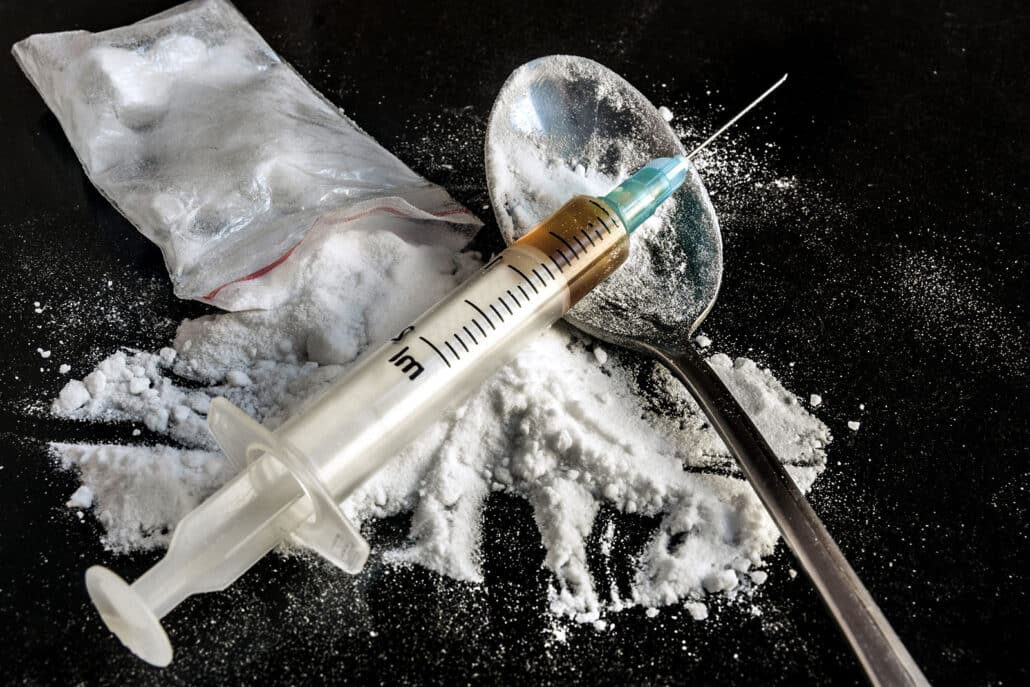Heroin is an illegal opioid that people may inject, snort or smoke. In 2021, more than 80,000 overdose deaths in the United States involved opioids.[1] There were 9,173 heroin-related deaths in 2021.[2] About 75% of those deaths also involved fentanyl or other synthetic opioids.

Illegal drug use costs the United States about $215 billion per year. It negatively affects individuals and communities by increasing medical costs, reducing productivity and straining the justice system.[3] Fortunately, there is help for people who struggle with heroin addiction. The first step in the recovery process is detox. It is important to understand dependency, what detox involves and what happens after detox.
Table of Contents
- 1 Understanding Heroin Dependency
- 2 Recognizing the Need for Detox
- 3 The Heroin Detox Process
- 4 Potential Heroin Withdrawal Symptoms
- 5 Duration of Heroin Detox
- 6 Understanding PAWS
- 7 Medical Interventions in Heroin Detox
- 8 Importance of a Safe and Structured Environment
- 9 Post-Detox Considerations
- 10 Overcoming Common Fears About Detox
- 11 Our Role in Heroin Detox and Treatment
- 12 Find a Detox Facility Near Long Island
Understanding Heroin Dependency
There are differences between tolerance, dependence and addiction. Tolerance occurs as the brain and body adapt to the continual presence of a substance. At that point, a person needs more of a substance to achieve the same effects.[4] Dependence happens when the body relies on a drug. If a person who is dependent on heroin stops using it, withdrawal symptoms start. Dependence can lead to addiction.
When people become addicted to heroin, they often make poor decisions. Brain scans of people who are addicted to drugs often show changes in the area of the brain that controls judgment.[5] As a result of heroin’s effects on the brain, people are often unable to stop using it despite the negative consequences. This is why professional help is important to overcome addiction.
Recognizing the Need for Detox
Since heroin and other opioids can affect breathing and the heart, an overdose can be fatal. People often mistakenly overdose when they become dependent and feel like they need a higher dose. If dependence signs exist, it is important to seek a detox program quickly. A person who is dependent may be unable to function without heroin and will feel sick without it.
Detox is an essential part of recovery. Supervised detox includes support from a team of doctors and other medical professionals. When people try to detox without medical supervision, they face several risks. In some cases, the withdrawal symptoms may lead to serious complications. For example, vomiting and diarrhea can lead to severe dehydration and heart failure.[6] Additionally, cravings are stronger during withdrawal. People who are unsupervised may relapse and overdose.
The Heroin Detox Process
The process starts with a full assessment. Medical professionals want to know about dietary restrictions, health history, heroin use history and more. After a full medical evaluation, it is easier to determine the severity of dependence. The next step is stabilization.

To help manage withdrawal symptoms, doctors can prescribe various medications. For example, there are medications that can alleviate nausea and stop diarrhea. Some people may also take medications that reduce heroin cravings and make detox easier. These will be discussed more in an upcoming section. Medical professionals ensure that people are as comfortable as possible during detox. Professional facilities include sanitary bathrooms, comfortable beds, nutrition programs and laundry service.
In addition to physical support, people receive psychological and emotional support from trained professionals. These professionals help people who struggle with heroin addiction overcome the mental challenges of detox. Also, detox facility staff members help guide patients toward the next steps of the recovery journey.
Potential Heroin Withdrawal Symptoms
There are several potential symptoms of heroin withdrawal.[7] These are some common ones:
- Uncontrollable leg movements
- Jitters
- Muscle and bone pain
- Cold flashes or chills
- Diarrhea
- Vomiting
- Insomnia
- Agitation
- Depression
- Anxiety
- Mood swings
Duration of Heroin Detox
Detox timelines can differ based on individual factors. Professionals realize that each person has a different use history, health needs and more. Early withdrawal symptoms can start within a matter of hours. They are mild at first and gradually worsen.
Symptoms often reach their peak severity on the second or third day. In some cases, they may last more than a week. However, they usually improve within a couple weeks. Even after the symptoms of withdrawal disappear, cravings continue. They can be especially strong during the weeks that follow symptom improvement.
Understanding PAWS
An important factor to consider is post-acute withdrawal syndrome. PAWS may last for months or even years.[8] These are some common symptoms:
- Irritability or hostility
- Difficulty sleeping
- Brain fog
- Cravings
- Mood disorders or mood swings
- Fatigue
- Reduced motor function
- Memory problems
The good news is that there are treatments available. Professionals assess each person’s needs to determine the right approach. Ongoing treatment may involve medications, individual therapy, group therapy and more.

Medical Interventions in Heroin Detox
Some people benefit from a detox plan that involves taking special medications to treat opioid addiction. While most people taper off the medications, some take them for many years. One of the most popular drugs for opioid addiction treatment is methadone. It has been used since the late 1940s and helps reduce withdrawal symptoms.[9] Methadone may help people who struggle with severe cravings or have a long history of misuse. Buprenorphine and clonidine are two similar medications that medical professionals may recommend.
Buprenorphine and methadone are opioid agonists, and clonidine is an alpha-2 adrenergic agonist. Research shows that opioid agonists work better at reducing the severity of symptoms.[10] Also, they may improve retention. Buprenorphine provides greater flexibility in dosing.[10] However, clonidine may help patients detox faster. Medical professionals can recommend the right medication for each person’s needs.
Importance of a Safe and Structured Environment
As mentioned in an earlier section, at-home detox attempts can increase the risks of withdrawal complications and overdose. Supervision ensures that people do not have access to heroin. People who detox in a facility can also participate in activities with peers, individual therapy and more. They learn how to build support networks and discover healthier lifestyle choices.
Post-Detox Considerations
While detoxing is the first step, recovery is a lifelong journey. However, it is a rewarding one. As people leave detox, they learn which steps to take next. Each person’s recommended treatment plan varies based on individual needs. Ongoing treatment often includes behavioral therapy, support groups, family counseling and other evidence-based therapies.
In therapy, people learn how to identify their strengths, weaknesses, triggers and more. Also, they learn strategies that help them avoid triggers and cope with life. They may address past trauma and take steps to heal from it. Peer groups help people build meaningful relationships with others who struggle with heroin addiction.
Overcoming Common Fears About Detox
People often avoid detox because they fear discomfort, stigma, relapse and the unknown. Some may also fear living without heroin. It is okay to feel a wide range of negative emotions about any life change. With the help of trained professionals in detox facilities, people learn how to overcome their fears.
Several celebrities have gone through heroin detox and have spoken positively about it. Eric Clapton struggled with heroin use and other addictions. After he went to rehab, he stayed sober through the death of his son and other difficult life events. Keith Richards was ordered to seek treatment for heroin misuse in 1978. He managed to avoid heroin after that. Nicole Richie was also ordered to seek treatment in 2003. After rehab, she stayed away from heroin and used her experience to help others.

Our Role in Heroin Detox and Treatment
Long Island Interventions helps connect people with reputable detox facilities in the area. We can also help people in the Queens and Staten Island areas. As our name suggests, we provide professional intervention resources as well. Our team connects people to solution-focused groups, medication-assisted treatment and more.
We provide information about inpatient treatment, intensive outpatient treatment, sober living facilities and other structures. Long-term treatment and relapse prevention are important for anyone who wants to break the cycle of addiction. Our goal is to help each person find the right solutions for their unique needs.
Find a Detox Facility Near Long Island
Although there may still be stigmas in society, you will not find those behind the doors of a detox facility. You will be welcomed by supportive staff and peers who also struggle with addiction. When you put yourself first, you can start living a fuller life. We are here to help you find the right detox facility for yourself or a loved one.
Please contact Long Island Interventions for information about Heroin Addiction Treatment near you.
References
[1] https://www.cdc.gov/drugoverdose/deaths/index.html
[2] https://nida.nih.gov/research-topics/trends-statistics/overdose-death
[3] https://www.justice.gov/archive/ndic/pubs38/38661/drugImpact.htm
[4] https://www.webmd.com/mental-health/addiction/tolerance-dependence-addiction-explained
[5] https://nida.nih.gov/publications/drugs-brains-behavior-science-addiction/drug-misuse-addiction
[6] https://ndarc.med.unsw.edu.au/blog/yes-people-can-die-opiate-withdrawal
[7] https://www.webmd.com/mental-health/addiction/heroin-use
[8] https://www.medicalnewstoday.com/articles/post-acute-withdrawal-syndrome
[9] https://www.ncbi.nlm.nih.gov/pmc/articles/PMC7239727/
[10] https://www.ncbi.nlm.nih.gov/pmc/articles/PMC10324876/
Drug & alcohol detox programs are not directly offered by Long Island Interventions. However, we do recognize that this type of addiction treatment is often necessary and vital to one’s long-term recovery from substance abuse. If you or a loved one require any services that we do not offer we would be glad to refer you to one of our trusted affiliate providers.

